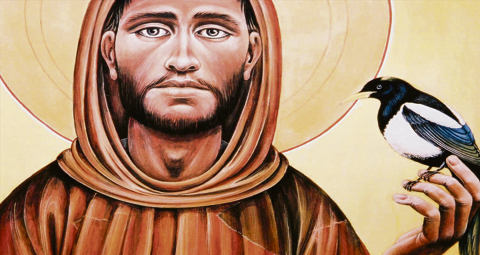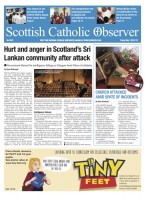October 23 | ![]() 0 COMMENTS
0 COMMENTS ![]() print
print

We must displace ego and narcissism
Fr Ronald Rolheiser
The Buddhists have a little axiom that explains more about ourselves than we would like. They say that you can understand most of what’s wrong in the world and inside yourself by looking at a group-photo. Invariably you will look first at how you turned out before looking at whether or not this is a good photo of the group. Basically, we assess the quality of things on the basis of how we are doing.
René Descartes must be smiling. He began his philosophical search with the question: What’s the one thing that’s indubitable? What’s the one thing, for sure, of which we can be certain. His answer, his famous dictum: I think, therefore I am!
Ultimately what’s most real to us is our own consciousness. And it’s so obsessively real that, until we can find a maturity beyond our natural instincts, it locks us inside a certain prison. What prison? Psychologists call it narcissism, an excessive self-preoccupation that keeps us fixated on ourselves and
on our own private headaches and idiosyncratic heartaches. Like the
Buddhist commentary on the group-photo, we worry little about how others are doing; our focus is first of all upon ourselves.
And this condition is not a childish thing that can be brushed off by glibly affirming that we have grown-up, are beyond ego, and are unselfish. Ego and its child, narcissism, do not go away simply because we consider ourselves mature and spiritual. They’re incurable because they’re an innate part of our make-up. Moreover, they’re not meant to go away, nor are they, in themselves, a moral defect. Our ego is the centre of our conscious personality, part of our core make-up, and each of us needs a strong ego to remain glued-together, sane, healthily self-protective, and able to give of oneself to others.
But it usually comes as a shock to people when someone suggests that great people, spiritual people, have strong egos. For example, Francis of Assisi, Theresa of Avila, Therese of Lisieux, and Mother Teresa, for all their humility, had strong egos, namely, they had a clear sense of their own identity, their own giftedness, and their own importance. However, in each case, they also had the strong concomitant sense that their persons and gifts did not originate with themselves and were not meant for them. They were clear that the source of their giftedness was God and that their gifts were intended not for themselves but for others.
And, in that, lies the difference between having a strong ego and being an egoist. An egoist has a strong ego and is gifted, but he understands himself as both the creator and objective of that gift. Conversely, great people have strong egos but are always aware that their giftedness does not come from them, but is something flowing through them as a gift for others.
The goal in maturing then is not to kill the ego but rather to have a healthy ego, one that is integrated into a larger self that precisely is concerned with the group-photo. But coming to that maturity is a struggle that will leave us, too often, in either inflation (too full of ourselves and too unaware of God) or in depression (too empty of our own value and too unaware of God).
Maturity and sanctity do not lie in killing or denigrating the ego, as is sometimes expressed in wellmeaning —though misguided—spiritualities, as if human nature was evil. Ego is integral and critical to our natural make-up, part of our instinctual DNA. We need a healthy ego to be and remain healthy. So the intent is never to kill or denigrate the ego, but rather to give it its proper, mature role, that is, to keep us sane, in touch with our gifts, and in touch with both the source and intent of those gifts.
But this can only be achieved paradoxically: Jesus tells us that we can find life only by losing our lives. A famous prayer attributed to Francis of Assisi (above) gives this its classic, popular expression: O divine Master, grant that I may not so much seek: to be consoled as to console; to be understood as to understand; to be loved as to love. For it is in giving that we receive; it is in pardoning that we are pardoned; and it is in dying to self that we are born to eternal life.Only by denying our ego can we have a healthy ego.
Finally, some wisdom about ego from the Taoist master, Chuang Tzu: If you are crossing a river in small boat, he says, and another boat runs into you, you will be angry if there is someone steering that runaway boat; but you will not experience that same anger if the boat is empty. Why no anger then? Chuang Tzu’s answer: A person who has let go of his or her ego ‘leaves no trace.’ Such a person does not trigger anger in others.
—Fr Ronald Rolheiser is a priest and member of the Missionary Oblates of Mary Immaculate. He is president of the Oblate School of Theology in San Antonio, Texas. Visit his website at www.ronrolheiser.com










